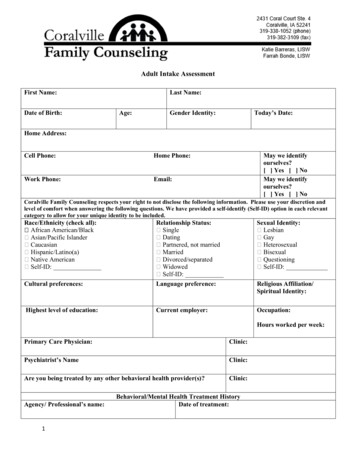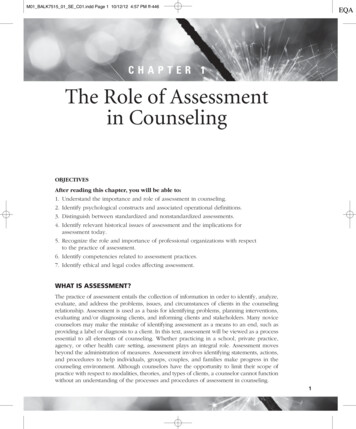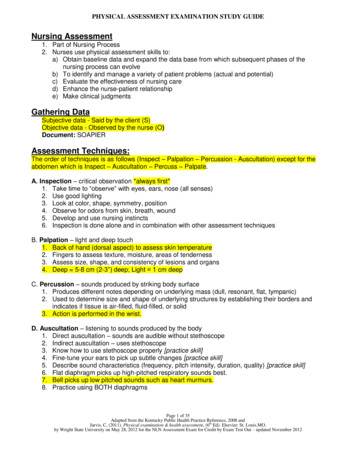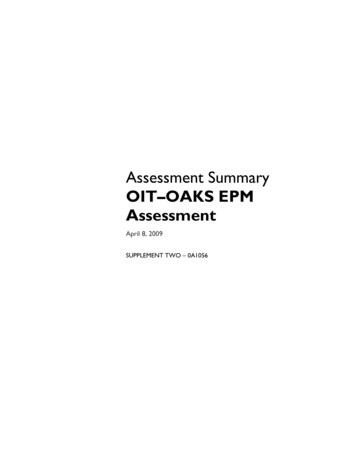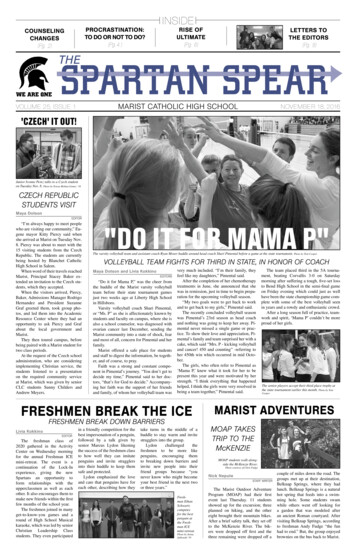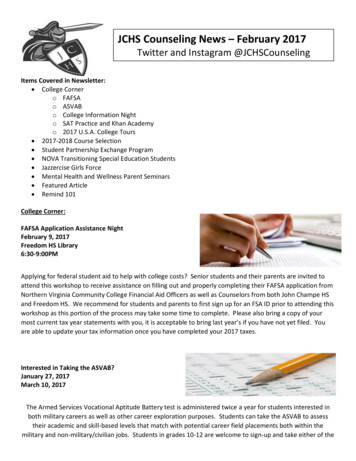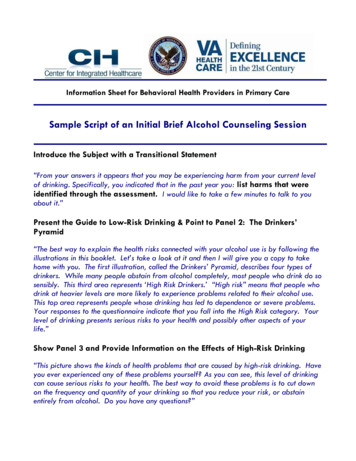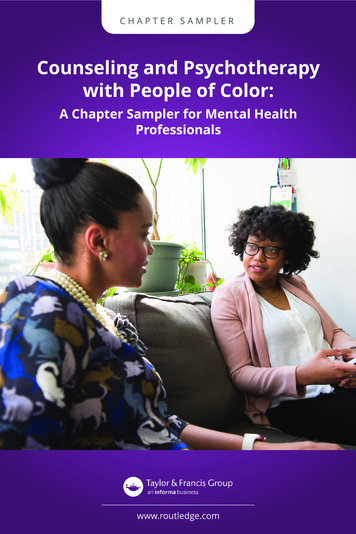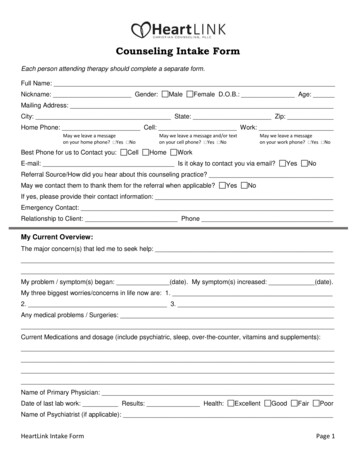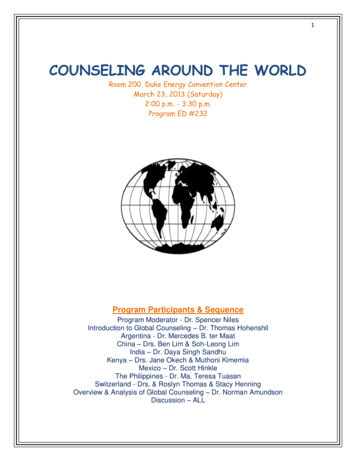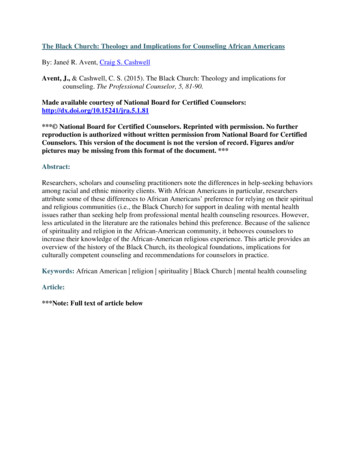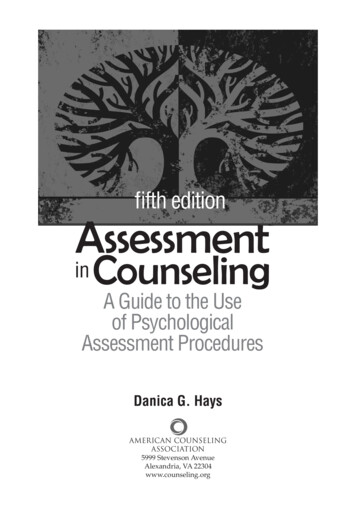
Transcription
AssessmentinCounselingA Guide to the Useof PsychologicalAssessment ProceduresDanica G. HaysAMERICAN COUNSELINGASSOCIATION5999 Stevenson AvenueAlexandria, VA 22304www.counseling.org
AssessmentinCounselingA Guide to the Useof PsychologicalAssessment ProceduresCopyright 2013 by the American Counseling Association. All rights reserved. Printed in theUnited States of America. Except as permitted under the United States Copyright Act of 1976,no part of this publication may be reproduced or distributed in any form or by any means, orstored in a database or retrieval system, without the written permission of the publisher.10987654321American Counseling Association5999 Stevenson AvenueAlexandria, VA 22304Director of Publications Carolyn C. BakerProduction Manager Bonny E. GastonEditorial Assistant Catherine A. BrumleyCopy Editor Kimberly KinneCover and text design by Bonny E. GastonLibrary of Congress Cataloging-in-Publication DataHays, Danica G.Assessment in counseling : a guide to the use of psychological assessment procedures /Danica G. Hays—5th ed.p. cm.Rev. ed. of: Assessment in counseling/Albert B. Hood and Richard W. Johnson. 4th ed.c2007.Includes bibliographical references and index.ISBN 978-1-55620-318-3 (alk. paper)1. Psychological tests. 2. Counseling. I. Hood, Albert B. (Albert Bullard), 1929– Assessment in counseling. II. Title.BF176.H66 2013150.28’7—dc232012026881
For Chris—my partner, best friend, and colleague.Thank you for making everything more meaningful.iii
Table of ContentsPrefaceAcknowledgmentsAbout the AuthorxixiiixvSection IFoundations of Assessment in CounselingChapter 1Use of Assessment in CounselingChapter 2Introduction to AssessmentKey Assessment TermsPurpose of Assessment in CounselingHistory of AssessmentAssessment Usage in Counseling SettingsKey Questions for Selecting AssessmentsChapter SummaryReview QuestionsThe Assessment ProcessTypes of Assessment MethodsAn Overview of the Assessment ProcessAssessing the Assessment Process:Evaluating Counseling OutcomesChapter SummaryReview QuestionsChapter 3Ethical, Legal, and ProfessionalConsiderations in AssessmentStandards and Guidelines forEvaluating Tests and Test Usage33469152022242525293740404142v
vi Table of ContentsChapter 4Key Ethical and Legal Considerations in AssessmentProfessional Issues in AssessmentChapter SummaryReview QuestionsMulticultural Considerations in AssessmentFairness and Cultural Bias in AssessmentCultural Factors in AssessmentAssessment and GenderAssessment and Race, Ethnicity,and Socioeconomic VariablesCulture-Fair TestsDisability and AssessmentAssessment of Older AdultsChapter SummaryReview Questions4753565759606269707477808384Section IIBasic Statistical and Measurement ConsiderationsChapter 5Measurement ConceptsScales of MeasurementReliabilityValidityAssessment DevelopmentChapter SummaryReview QuestionsChapter 6Understanding and Transforming Raw ScoresRaw ScoresMeasures of Central TendencyMeasures of VariabilityCharacteristics of Data DistributionsNorms and RanksStandard ScoresStandard Error of MeasurementChapter SummaryReview 118118SectionSection IIIInitial Psychological AssessmentChapter 7Initial Assessment in CounselingIntake InterviewMental Status ExaminationScreening InventoriesSuicide Risk Assessment121122123123130
Table of Contents viiDiagnostic and Statistical ManualChapter SummaryReview QuestionsChapter 8Substance Abuse and Mental Health AssessmentPrevalence of Mental DisordersAssessment of Alcohol AbuseAssessment of DepressionAssessment of Anxiety and FearAssessment of AngerAssessment of Self-InjuryAssessment of Eating DisordersAssessment of Attention-Deficit/Hyperactivity DisorderChapter SummaryReview 3Section IVTypes of AssessmentChapter 9Assessment of Intelligence167Ability Testing: Academic Aptitude and Achievement183Career and Life-Planning Assessment203Measures of Interests and Values225Chapter 10Chapter 11Theories of IntelligenceIndividual Intelligence TestsGroup Intelligence TestsGiftedness and CreativityChapter SummaryReview QuestionsIntroduction to Aptitude and Achievement AssessmentAptitude Tests for Higher EducationGraduate and Professional Schools Admissions TestsAcademic Achievement TestsHigh-Stakes TestingStudy Habits InventoriesChapter SummaryReview QuestionsChapter 12Introduction to Career and Life-Planning AssessmentMeasures of Career ReadinessIntroduction to Comprehensive Assessment ProgramsStandardized Assessment ProgramsChapter SummaryReview QuestionsIntroduction to Interest InventoriesPopular Interest 202204205213214222223226227
viii Table of ContentsValues InventoriesChapter SummaryReview QuestionsChapter 13Personality AssessmentIntroduction to Personality AssessmentPopular Structured Personality AssessmentsPopular Unstructured Personality AssessmentsHealth and Lifestyle InventoriesChapter SummaryReview QuestionsChapter 14Assessment of Interpersonal RelationshipsInventories for Couples and Family CounselingAssessment of Intimate Partner ViolenceAssessment of Child AbuseGenogramsAdditional Interpersonal Assessment InventoriesChapter SummaryReview 9290294295296Section VThe Assessment ReportChapter 15Communication of Assessment Results299Publishers of Tests Commonly Usedby Counselors With the Test Names and Acronyms311Web Links for Ethical Guidelinesand Assessment Standards321Statistical Formulas323Sample Assessment Report325Appendix AAppendix BAppendix CAppendix DCommunication of FindingsThe Assessment Interpretation InterviewThe Case ConferenceThe Assessment ReportChapter SummaryReview Questions300301304305309309
Table of Contents ixAppendix ETest Your Knowledge Answer Key331ReferencesSubject IndexName Index333373388
PrefaceThe purpose of this book is to provide information about the various assessment procedures that are specifically relevant for practicing counselors. The book deals with the useof these assessment procedures in the counseling process and emphasizes the selection,interpretation, and communication of psychological test results and highlights the basicprinciples of psychological assessment. It stresses the importance of integrating assessment results with other information about the client. One primary assumption undergirdsthis text: Counselors engage in assessment practices every day, and these practices affectrelationships, treatment decisions, and culturally responsive counseling. Furthermore, assessment involves both quantitative and qualitative indicators.The book is not designed to be a comprehensive textbook or desk manual on the variousassessment tools themselves. There are a number of excellent books that describe psychological tests and other assessment procedures in detail. It is expected that counselors will makeuse of such publications along with other resources as they evaluate assessment tools. Aswith the previous editions, the latest developments regarding those assessments commonlyused by counselors and other mental health professionals are included. New to this editionare some innovative ways to integrate assessment into the counseling profession.Some of the key features of the fifth edition of the text include the following: bolded key terms to facilitate comprehension of major concepts;chapter pretests (“Test Your Knowledge”) to gauge previous learning;self-development activities, such as reflective exercises and class and field activities;“Tip Sheets,” or practical, user-friendly information about major assessment concepts, issues, and practices;inclusion of practitioner voices of various assessment topics (“Assessment inAction”);case examples that highlight assessment issues and score reports;sample assessment items with an expanded list of common assessment tools;coverage of the history of assessment, test access issues, cultural bias in assessment,high-stakes testing, qualitative assessment, and specialty areas of assessment andrelated standards;review questions and chapter summaries;sample assessment report; andcommon statistical formulas used in assessment.xi
xii PrefaceThe text is organized into five sections. Section I, Foundations of Assessment in Counseling, includes introductory concepts of assessment that are useful for conceptualizingmeasurement and statistical concepts and working with various types of assessment. Thefour chapters in this section include a discussion of basic assessment terms; the history ofassessment; purpose and use of assessment; the assessment process related to selection,administration, interpretation, and communication; ethical, legal, and professional issuesin assessment and related assessment standards; and multicultural assessment practices.Section II, Basic Statistical and Measurement Considerations, includes two chapters thataddress foundational knowledge in statistics and measurement. Specifically, the followingconcepts are discussed: scales of measurement; reliability, validity, and correlation; testdevelopment; measures of central tendency and variability; and raw score transformation.Section III, Initial Assessment in Counseling, includes two chapters related to commonassessment tasks typically found at the beginning of the counseling relationship to gaugemental health and substance abuse symptoms. This section addresses the intake interview;mental status examination; several general screening inventories; specialized assessmentof suicide risk, substance abuse, depression, anxiety, anger, self-injury, eating disorders,and attention-deficit/hyperactivity disorder; and use of the Diagnostic and Statistical Manual of Mental Disorders.Section IV, Types of Assessment, is the largest section and includes six chapters. The section is devoted to specific classes of assessment, including intelligence, ability, career development, and personality. In this edition you will find expanded coverage in areas suchas high-stakes testing, projective assessments, and interpersonal assessment involving intimate partner violence and child abuse. Furthermore, recent revisions in intelligence andability assessment are discussed. Section V, The Assessment Report, provides one chapterthat outlines general guidelines for communicating assessment findings to a client andother stakeholders as well as developing a research report. The text also includes severalappendices: names and acronyms of commonly used tests with publisher contact information (Appendix A), web links for ethical guidelines and assessment standards (AppendixB), common statistical formulas (Appendix C), a sample assessment report (Appendix D),and an answer key for “Test Your Knowledge” items (Appendix E).In graduate courses that cover the use of tests and other assessment procedures in counseling, information about the various tools is typically covered, but the actual use of psychological assessment procedures in counseling often must be learned through trial anderror. This text should help remedy that situation by providing information to assist thecounselor in choosing, administering, and interpreting assessment procedures as part ofthe counseling process.
AcknowledgmentsI thank Carolyn Baker, American Counseling Association (ACA) director of publications,for her support and responsiveness throughout the writing and production process. I amalso grateful for the work of Bonny Gaston, production manager, and the other ACA staffmembers who made this edition possible.I appreciate the contributions of Albert B. Hood and Richard W. Johnson to the practiceof psychological assessment in general and as authors of the previous editions of this text.The counseling profession has certainly been influenced by their countless achievementsin research and practice, and I am humbled to build on their work in this fifth edition.Finally, I am thankful for my students and mentors in the assessment world who remindme every day of the important role of assessment. xiii
About the AuthorDanica G. Hays, PhD, LPC, NCC is an associate professor of counseling and chair of theDepartment of Counseling and Human Services at Old Dominion University. She is arecipient of the Outstanding Research Award, Outstanding Counselor Educator Advocacy Award, and Glen E. Hubele National Graduate Student Award from the American Counseling Association as well as the recipient of the Patricia B. Elmore Excellencein Measurement and Evaluation Award and President’s Special Merit Award fromthe Association of Assessment in Counseling and Education (AACE). Hays served asfounding editor of Counseling Outcome Research and Evaluation, a national peer-refereedjournal of the AACE, and is editor of Counselor Education and Supervision, a nationalpeer-refereed journal of the Association for Counselor Education and Supervision. Sheserved as president of the AACE in 2011–12. Her research interests include qualitativemethodology, assessment and diagnosis, trauma and gender issues, and multicultural andsocial justice concerns in counselor preparation and community mental health. She haspublished numerous articles and book chapters in these areas and coauthored or coeditedfive books to date: Developing Multicultural Counseling Competence: A Systems Approach;Qualitative Inquiry in Clinical and Educational Settings; Mastering the National Counselor Examand the Counselor Preparation Comprehensive Exam; The ACA Encyclopedia of Counseling;and A Counselor’s Guide to Career Assesment Instruments. xv
Initial Assessment in Counseling 121 Intake Interview 122 Mental Status Examination 123 Screening Inventories 123 Suicide Risk Assessment 130. Table of Contents vii Diagnostic and Statistical Manual 135 Chapter Summary 138 Review Questions 139 Chapter 8 Substance Abuse and Mental Health Assessment 141 Prevalence of Mental Disorders 142 Assessment of Alcohol Abuse 143 Assessment
